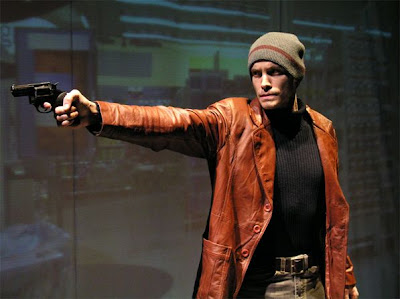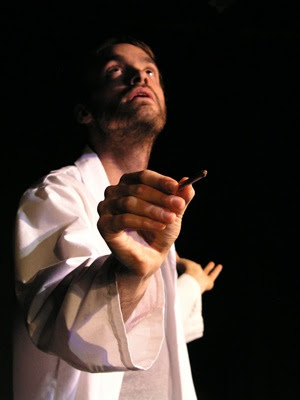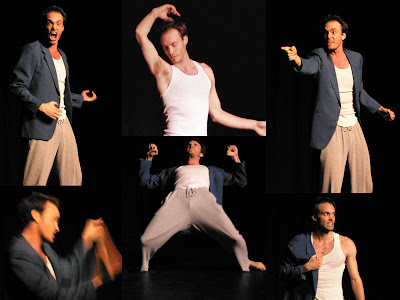More random thoughts on multimedia theatre…

Starting with, “What the hell does multimedia theatre mean anyway???”
It’s one of those lovely bits of language that gets used all the time but nobody really has a handle on its actual definition… just more of a sense of the kind of reaction it’ll produce. Like “physical theatre” or “new media.” Or,
“group think.” Let’s do a quick Google search, shall we?
According to Whatis.com, when multimedia is used in live situations it can be “the use of a speaker or actors and ‘props’ together with sound, images, and motion video.” Or,
if you check out Scala.com, “The term multimedia describes a number of diverse technologies that allow visual and audio media to be combined in new ways for the purpose of communicating.”
A slide show? A film strip? With (gasp!) sound design??? … yah ok. But nowadays, more likely than not, we’re talking computers. The last few shows I’ve been involved in, a good portion of the production was run off of a Mac laptop. Most young indie producers and designers I’ve recently met own a Mac laptop. Which means more and more shows will continue to incorporate multimedia elements, whether they are designed to fall under the umbrella of “multimedia theatre” or not.
Accessibility is wonderful. But just because my sound design is collection of mp3 tracks played during blackouts, I’m not going to label my show a multimedia production. In fact, few artists would describe a piece as multimedia… even if they’ve included digital projections or other elements... because there is a negative perception that persists.
Why?
Maybe we should look at artists who would rather describe their productions as multimedia than not (… and I’m going to grossly over-generalize here, so please bear with me). I’m going to wager that any theatre artist that labels his/her work as “a multimedia production” has either made a huge error in marketing the piece, or is generally much more concerned with form rather than content. Or, (if I’m more charitable) said artist is more willing to experiment with form… but still at the expense of its substance.
This is a problematic approach. I mean, yes, there is a market for experimentation. But it’s a small one. If you’re okay with that, then go hard. But don’t expect the general public to swarm to your show. An audience’s greatest fear in checking out new works of art is to be made to feel stupid. Experimental theatre usually makes a lot of smart people feel stupid.
I believe in experimentation in theatre. However, I don’t believe in experimentation for the sake of experimentation… unless you’re in school or (maybe) if you’re workshopping a piece. The difference lies in approach. Are you asking, “How can I incorporate multimedia into this work?” You should rather be asking, “What do I need to tell this story?”
A cynic would answer, “You don’t need anything except an audience.” Which I suppose is true, in a kind of fundamentalist point of view. But the key to the question lies within the artist who’s asking, “What do
I need?” Because any story will speak to each artist differently, and each artist’s approach to communicating an impression to an audience will be just as unique. S/he is only limited by what tools are available for use.
… Am I then saying that some artists are more predisposed than others to incorporate multimedia elements into their productions? Of course I am. Just as some dancers are more predisposed towards contact improv rather than ballet. And some directors are more predisposed to Shakespeare rather than collective creation. And so on.
As much as my career thus far has generally played out on the sunnier side of experimental theatre, I may be more conservative in my approach than one might guess. While performing in Edmonton, I labeled myself as an actor specializing in physical theatre and collective creation. This didn’t necessarily mean I was always looking for a way to incorporate those elements into my work. It was more of a call to likeminded souls who saw the world in similar ways. It meant that the questions were larger than "How do we incorporate physicality into the work?"; rather, the questions revolved around “What do we want to talk about/ what do we want to create?” Content was key. Form -- experimental/ physical/ collective/ whatever -- was intrinsic.
Now, again, our mistake was less about approach (in my humble opinion) but rather in marketing. (… And, to some extent, execution, but that’s another issue altogether…). We advertised under those labels: ‘collective creation,’ ‘physical theatre’ and even ‘experimental’. And, somehow we were shocked when throngs of people weren’t lining up to buy tickets. Go figure.
Anyway, enough about me: I was talking about incorporating multimedia into theatre, and ended up somewhere along the lines of audience stigma and perception. And marketing. Why on earth does every blog entry always end up about getting bums in seats???
My point is this: multimedia will be used in theatre more frequently because it’s easy to use and increasingly accessible. Does it signify a grand shift in theatrical style? Maybe. Will it lead to larger audiences coming to check out theatre? Probably not – but, as with anything else, it depends on the specific production.
… Is it necessary?
It depends. Start here instead: Who are you?



















